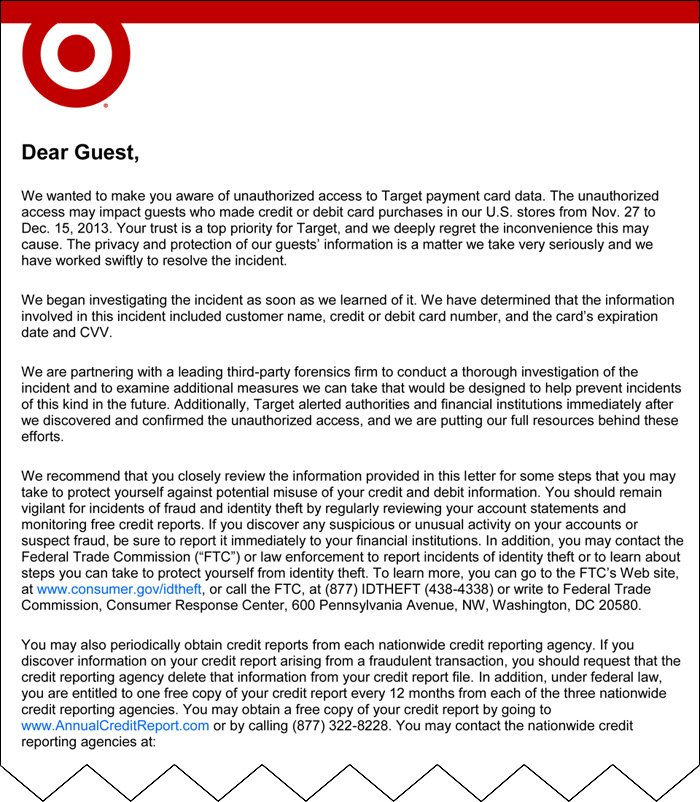Crisis Management
Target as Target

After fumbling its initial response to a massive data breach, Target Corp. has rebounded, according to experts in crisis management.
However, they said, the retailer still faces challenges in regaining consumer confidence, especially among people directly harmed by the cyber attack, which struck at the height of the holiday shopping season.
In late November and early December, malware lodged in the retailer’s point-of-sale system siphoned off account and personal information for up to 110 million customers. But Minneapolis-based Target is not the only company that may have been struck. Luxury retailer Neiman Marcus suffered a smaller breach, and news reports suggest at least six other retailers have been hit. These other companies likely are keeping a close eye on Target’s handling of the crisis.
Critics have focused, in part, on the company’s early communications. Target appeared initially to underestimate the gravity of the situation, crisis consultants said. For example, Target’s first message to customers apologized for the inconvenience.
“You don’t call something like this an inconvenience,” said Rich Klein, a crisis management consultant in New York City.

Initial email (truncated) sent by Target on 12/19/2013. The original email included an additional 4 pages of information.
Subsequent messages from Target used stronger language, acknowledging customers’ stress and anxiety, he said. Messages also switched from assuming customer confidence to promising to regain it, Klein added, praising the change.
“I would still say it’s so much better to get it right the first time,” he said.
Still, he added, the company made good use of its Twitter feed and Facebook page. Facebook, for example, was used only to communicate about the breach, not to advertise sales, though it also acted as something of a lightning rod for complaints.
Consultants also panned the company’s decision to extend a 10 percent discount to shoppers during the weekend of Dec. 21, a few days after news of the breach first surfaced. While the discount was a nice gesture, it did not adequately address customer concerns and seemed to suggest the crisis had passed, consultants said.
In addition, the company has occasionally appeared to be behind the news, with information trickling out in the media before being revealed by Target, said Jeff Jubelirer, vice president of Philadelphia-based Bellevue Communications Group. “We should expect more from a retailer of that size and that reputation and that level of success.”
A key turning point came on Jan.13 when the company’s CEO, Gregg Steinhafel, appeared on CNBC, apologizing for the breach, reassuring customers and defending the company’s reaction:
Steinhafel should have been giving interviews in December, said Jonathan Bernstein, an independent crisis management consultant in Los Angeles. “They would have suffered less loss of sales and less impact on their stock value if they had been more assertive from the get-go.”
Other observers gave Target high marks for making a relatively quick disclosure of the breach and offering a free year of credit monitoring to customers. The four-day gap between discovery of the breach on Dec. 15 and public disclosure on Dec. 19 was faster than it’s been in other cases, said Alysa Hutnik, an attorney in the Washington, D.C. office of Kelley Drye.
“I haven’t done the math, but I think that would rate somewhere at the very top,” said Hutnik, who specializes in cyber security issues.
Another high point is the prominent role of Target’s CEO, Hutnik said. “He knows there’s work to be done to earn back customer trust, and it looks like he is taking that obligation seriously,” she said, noting that top executives rarely serve as public faces after a data breach.
Other positive steps include Target’s $5 million investment in cyber security education said Michael Soza, a partner in accounting and consulting firm BDO.
“This latest move … is really going on the offensive to show that they really are trying to get out in front of this thing and really attack what is not just a Target problem,” Soza said.
As long as no other damaging details leak out, most customers will remain loyal to the chain, said Daniel Korschun, an assistant professor of marketing at Drexel University in Philadelphia.
But the company will have to work harder to win back customers who suffered directly. They will be hard to find and hard to soothe, especially if they’ve had to spend hours on the phone undoing damage to their credit or bank accounts.
“Those are the ones where the trust has really been lost,” Korschun said.











